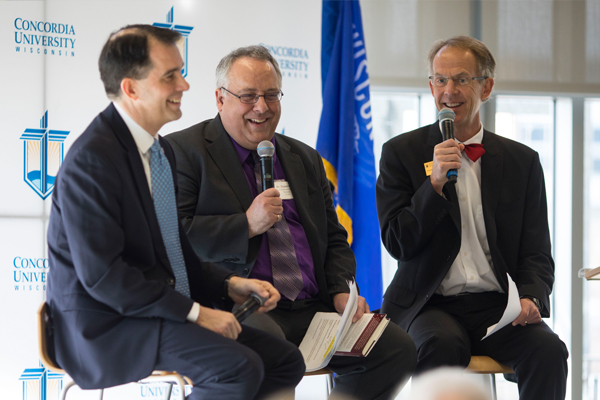
“Most Americans know more about their cell phone plans than they do about their health insurance,” Wisconsin Gov. Scott Walker quipped on Tuesday, March 21, to an audience of about 150 leaders and innovators in the health care, business, public policy and higher education spheres.
That needs to change, the governor asserted, and the answer starts with absolute transparency in medical pricing.
Market transparency was the theme of the Tuesday morning Healthcare Economics Summit: The Business of Healthcare, hosted by Concordia University Wisconsin.
The summit is just one of the ways Concordia is demonstrating its leadership and interest in the topic of controlling health care costs. University leaders announced last fall plans to build a new academic building to house its Batterman School of Business and health sciences programs. The building will be a space where free enterprise solutions to the health care crisis may be explored and put into practice.
The name of the building, which was announced as The Robert W. Plaster Free Enterprise Center at Tuesday’s event, reinforces Concordia’s commitment to help spur meaningful discussions on the subject and train future health care and business leaders to employ smart solutions in the workforce.
“Concordia University, as a Lutheran, Christian organization, cares deeply about the health of our students. It is in fact embedded in our mission statement to prepare students in ‘mind, body and spirit for service to Christ in the Church and the world,’” Concordia President Rev. Patrick T. Ferry said at the event. “But we also, by the very nature of our Christian mission, care deeply about the health of our neighbors and community and that is what we are demonstrating with efforts like the Robert W. Plaster Free Enterprise Center.”
 Dr. Daniel Sem takes a good-natured jab at Gov. Scott Walker's Twitter activity.
Dr. Daniel Sem takes a good-natured jab at Gov. Scott Walker's Twitter activity.
In addition to Gov. Walker, the Tuesday summit brought together an esteemed slate of speakers who illustrated the health care costs issue and who spoke about movement towards promising solutions.
The chairman of Wisconsin-based Serigraph Inc. and author of “The Grassroots Health Care Revolution,” John Torinus, Jr., spoke on the issue through the eyes of a businessman and shared how the health care business model “just plain doesn’t work.”
“If you haven’t got your costs under control in manufacturing, you’re out of business,” Torinus said. “You don’t need an advanced degree to understand that cost and access are inextricably intertwined.”
Instead, Torinus has moved Serigraph to a self-insured model. The company underwrites its own health care risks and in so doing, company executives have a greater incentive to manage their company’s risks, says Torinus.
Eric Haberichter, co-founder and CEO of Access HealthNet, spoke about “restoring dignity and affordability to patients” by creating an open marketplace where consumers have complete transparency in medical pricing.
Haberichter is making strides towards that end through Access HealthNet. The start-up is devoted to cutting health care costs for employers and employees by bundling medical care services, as he had done in his prior startup, Smart Choice MRI.
Additional speakers included: Valley Elliehausen, a CUW alumna who, as COO of the West Bend School District, has successfully moved the district to a self-insured model; EVP and President of Aurora Health Care Medical Group Dr. Jeffrey Bahr, who spoke about how an integrated health care delivery model can provide higher quality care at a lower cost; and CUW alumnus and President of Mercy Medical Center (part of Ascension) Jeremy Normington-Slay, who echoed Bahr’s philosophy on an integrated model and shared how his Concordia experience helped prepare him for his current role.
“Concordia shaped my worldview,” said Normington-Slay. “One of our values at Mercy Medical is reverence, which means that every person is made in the image of God and therefore, we believe every individual is priceless. When you believe every individual is priceless, you treat them in a certain way.”
Gov. Walker, the featured keynote, fielded questions from Ferry and Concordia’s Batterman School of Business Dean Dr. Daniel Sem to start the event. Walker expressed his goals and desires for health care and Medicaid reform in Wisconsin, sharing lessons learned from faith and his own upbringing.
The son of a pastor, Walker told how his father would welcome those in need into the church, asking that the individuals repay any monetary assistance given by helping out with chores around the parish. His father’s approach models his own approach to entitlement programs in many ways, Walker said.
“God created us to work, and there’s a dignity there,” Walker said. “What I try to do with health care is: we help people, but then we help them get back up on their feet again.”
That’s a goal for Concordia’s free enterprise center as well, said Sem.
“A focus of our Robert W. Plaster Free Enterprise Center will be to enable competition to drive down price while maintaining quality,” said Sem. “If we can institute market forces in a positive way, consumers will be empowered to make those choices in an informed, productive way. Our goal, and that of the disruptive innovators that presented today, is to consumerize health care by incentivizing, educating and empowering the health care consumer.”
— This story is written by Kali Thiel. Kali was Director of University Communications until April, 2025.
If this story has inspired you, why not explore how you can help further Concordia's mission through giving.